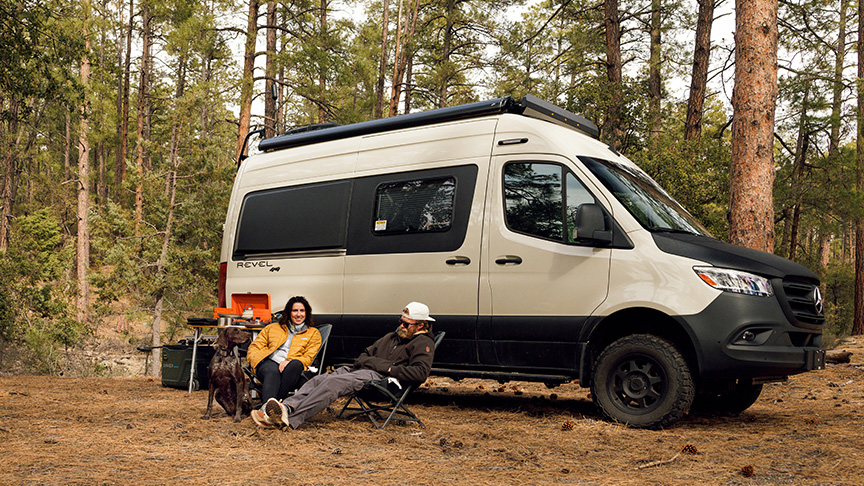
From packages to legal documents, learn what you need to collect mail and access services as a nomad based in the U.S.
When I first started traveling full-time, I was overwhelmed at the idea of having a permanent address where all my mail went, when I could be across the country or in another country—and, quite frankly, annoyed that I even needed an established domicile for legal, banking, and tax purposes.
While I lucked out with super cool parents who are happy to collect my mail and forward it when necessary, I know that not everyone has that option. Thankfully, there are other ways to establish a digital nomad address. This guide provides an overview of your options, so you can start traveling full-time without worrying about where your mail is going.
Related: Digital Nomad Accommodation Options From Hostels to RV Rentals
Mailing Address vs. Permanent Address
A mailing address is where you receive your mail and packages, while a permanent address is your legal, fixed address used for official purposes like voter registration, taxes, and obtaining identification. For digital nomads, the distinction is crucial. A mailing address can be flexible, such as a P.O. box or a virtual mailbox service, making it ideal for those constantly on the move. However, a permanent address is often tied to a specific state or country and signifies your official residence.
Understanding the difference can help you avoid pitfalls like using a temporary mailing address for legal documentation, which can lead to complications like items being returned undeliverable. Additionally, many financial institutions and government agencies require a permanent address, not a P.O. box or commercial mailing address, to verify your identity. Knowing when and how to use each type of address ensures your lifestyle remains seamless and legally compliant.
Why You Need a Permanent Address
A permanent address, or domicile, is essential in the U.S., even if you’re rarely in one place. It acts as your anchor to legal systems and institutions. Without one, you may struggle with critical tasks like renewing a driver’s license, opening a bank account, or filing taxes. A permanent address also ensures you stay connected to your home country, allowing you to vote, receive important government correspondence, and maintain access to health insurance or other essential services tied to residency.
Additionally, having a permanent address helps establish consistency and reliability, especially when dealing with employers, clients, or landlords. Even if you’re a freelancer or business owner, many services and contracts require a physical address to confirm your identity and credibility. While digital nomadism offers freedom, a permanent address serves as the foundation that keeps your nomadic life stable and well-organized. It will also serve you well if/when your travels end and you decide to settle down.
Related: 18 Digital Nomad Job Ideas for Aspiring Full-Time Travelers
Digital Nomad Address Options for Mail and Domiciling
Whether you are just looking to receive mail or you need to establish a domicile, there are options for you.
Friend or Family Member’s House
This is arguably the easiest way to set up a permanent, legal address as a digital nomad. It can also be your mailing address, knocking out two birds with one stone. Assuming you have a helpful friend or family member who won’t charge you money for collecting your mail, this option is also free, making it the all-around best way to establish an address as a digital nomad. The main downside is that it requires the collector to manually forward mail when needed, which can be expensive depending on what it is and the distance it’s being sent.
Benefits
- Straightforward and simple
- Easy to set up
- No cost
- Provides both a mailing address and physical address
Disadvantages
- Requires having a willing friend or family member
- Requires manual mail forwarding when necessary
- Person living at the home may not stay on top of mail
Rent a P.O. Box
Many digital nomads whose home base is the U.S. use a P.O. box to collect their mail. This can work if you regularly pass through the same place, don’t get a lot of mail, or rent a larger P.O. box size.
The catch is that in almost all cases, the U.S. Postal Service requires customers to have a physical, permanent address in order to rent a P.O. box. So, while this doesn’t solve the problem of needing a willing friend or family member, you might find that more people are willing to offer up their address if they aren’t actually expected to collect the mail.
One thing to consider is that if you need your mail forwarded (a.k.a, you aren’t able to pick it up on at least a semi-regular basis), this may not work for you. While the USPS does offer mail forwarding, it isn’t meant to be a permanent service. Typically, it ends six to 12 months after establishing a change-of-address, though you may be able to pay a monthly fee to keep it going.
Benefits
- Low-cost solution
- Easy to set up
- Secure way to receive mail
Disadvantages
- Typically requires a permanent address
- Requires mail forwarding if you can’t personally collect the mail
- Not all carriers deliver to P.O. boxes
USPS General Delivery
This free service from the USPS is an excellent option for digital nomads who move frequently and need a reliable way to access mail in a specific location. To use General Delivery, you simply write your name, "General Delivery," and the postal code (ZIP code) of the location of receipt on the address line.
Pro tip: Don’t actually write the address of the physical USPS location. Just write “General Delivery and the ZIP code. Writing the full street address may result in the parcel being returned to the sender or getting lost.
Your mail will be held for up to 30 days, giving you ample time to collect it. This is my personal favorite way to collect mail while living on the road, as it’s free for U.S. residents. However, it can be challenging to time the deliveries: You’ll need to plan your schedule carefully to ensure you’re in the right location when your mail arrives, which can be challenging for nomads with unpredictable travel plans.
Benefits
- Free to use for U.S. citizens and residents
- Provides mail collection almost anywhere in the country
- Easy and straightforward
Disadvantages
- Requires an ID, which requires a permanent address
- Does not function as a domicile
- Not all merchants ship to general delivery addresses
Rent a Mailbox
Some postal services offer mailbox rentals. The UPS Store, for instance, allows individuals and businesses to rent mailboxes that provide a true street address, as opposed to a P.O. box address. The big difference here is that not all carriers will deliver to a P.O box, but all will deliver to a street address.
The same is true for important legal and banking documents. These services also usually forward mail, though not always in the volume that a digital nomad may need. Keep in mind that mailbox rentals require proof of identity to set up, which means they require at least one form of ID.
Benefits
- Provides a real street address
- Most will sign for packages and important documents
- Typically accepts mail from all carriers
Disadvantages
- Requires mail forwarding if you can’t regularly collect your mail
- May only hold mail for short periods
- Requires a form of ID, which requires a permanent address
Use a Virtual Mailbox Service
A newer solution for individuals who are living and working on the road, virtual mailbox services collect, hold, process, and forward mail to nomads. Some of these services even serve as permanent addresses, eliminating the need to have a physical residence you’re able to list as your own. Popular services include US Global Mail, Anytime Mailbox, and iPostal1.
Benefits
- Highly flexible solution
- Can be an all-in-one solution
- Some offer permanent addresses
- Most include mail holding and forwarding
Disadvantages
- Can be expensive
- Some require a permanent address to set up
FAQs About Digital Nomad Address and Mailing
How to get a permanent address when traveling?
The easiest way to establish a permanent address while traveling is to use the address of a friend or family member. There are also services you can pay for that will help you establish a domicile in a certain state and also collect and forward your mail. If you have family or friends willing to help you out, you can use their address as your permanent address while you’re traveling, until you get your own address.
Can you live without a permanent address?
You can’t live without a permanent address in the U.S. without losing the ability to bank, vote, pay taxes, be employed, get health or vehicle insurance, receive legal documents, or get an ID. Essentially, a domicile is required to be a functioning member of society in the U.S.
How do digital nomads get their mail?
Digital nomads use a combination of methods to receive mail. Many enlist the help of friends or family members to collect and forward mail, while others pay for a virtual mailbox service. You can also use a P.O. box or general delivery services with the post office to receive mail, but keep in mind that those services generally require having a permanent address or an ID with a permanent address on it.
TravlFi Takeaways
It's easier than you might think to receive mail on the road, but not quite as easy to set up a permanent address when traveling, especially if you don’t regularly return to that address.
- Changing your address to that of a friend or family member is the easiest way to get and show proof of address for travelers.
- USPS General Delivery is an incredibly easy and free way to receive mail as a nomad in the U.S., but requires an ID.
- Renting a P.O. box or a mailbox from UPS is another way to receive mail, but requires proof of a permanent address and there are fees for mail forwarding.
- Some virtual mailbox services also offer permanent address services, which may be the best option for digital nomads who can’t use someone else’s physical residence.
Once you have your address situation sorted out, establishing a stable internet connection is the next step. TravlFi’s devices access multiple major carrier networks to automatically connect to the strongest signal where you are. Learn more about our modern RV and camper van hotspots.
More Essential Information for Aspiring Digital Nomads:
- How to Fill Prescriptions While Traveling
- Cons of Vanlife: What No One Will Tell You
- How to Make Your RV More Secure
- Complete Guide to Digital Nomad Health Insurance
- Digital Nomad Visa: Best Countries to Be a Digital Nomad
- How to Do Vanlife in the Winter
- How to Find Housing as a Full-Time Traveler
- Unique Ways to Fund Life on the Road

Article By: Amanda Capritto
Amanda Capritto is a fitness and outdoors journalist who travels full-time in a Winnebago camper van. Her work has appeared in national and global outlets like Lonely Planet, Reader's Digest, CleverHiker, CNET, and more.
